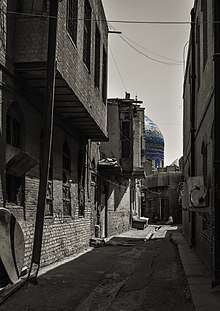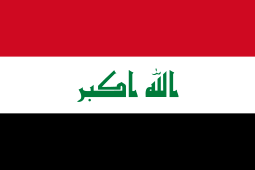Al-Ahmadiya Mosque
| Al-Ahmadiya Mosque | |
|---|---|
| جامع الأحمدية | |
 | |
| Basic information | |
| Location | Baghdad, Iraq |
| Affiliation | Sunni Islam |
| Architectural description | |
| Architectural type | Mosque |
| Architectural style | Ottoman |
| Creator | Ahmad Pasha al-Katkhadha |
| Completed | 1796 |
| Specifications | |
| Dome dia. (outer) | 11 meters |
| Site area | 2,600 m2 |
The Al-Ahmadiya Mosque (Arabic: جامع الأحمدية, also known as Mosque-Madrasa of Al-Ahmadiya (Arabic: جامع ومدرسة الأحمدية) or Al-Maidan Mosque (Arabic: جامع الميدان), is a historic mosque in Baghdad, Iraq. The mosque is located at the Al Rasheed Street in the southern part of Al-Rusafa,[1] and the east of the Al-Maidan Square near the Al-Muradiyya Mosque. The mosque was built in 1796 by Ahmad Pasha al-Katkhadha, the vice of the Mamluk ruler Sulayman Pasha the Great. The minaret was later added by his brother Abdullah Buk along with the madrasa. The mosque is also near the Al-Khulafa Mosque, the mosque dating back to the Abbasid era.[2]
Al-Ahmadiyya Mosque has an area of around 2600 square meters. Inside the mosque, there is a wide prayer space in front of the corridor. On the left side, there is a prayer room for summer, which is topped by the tall dome made of Qashani tiles and has a diameter of 11 meters. Minaret situates on the south of the dome. The wall of the mosque is painted with inscriptions of the Qur'anic verses, which was written by the calligrapher Sufyan al-Wahbi in 1850 who is buried in the mosque yard.[2] The mosque was restored in 2010 before holding the conference for the cabinet of Waqf al-Sunna.[3]
See also
References
- ↑ Marozzi, Justin. Baghdad: City of Peace, City of Blood. Penguin UK, May 29, 2014.
- 1 2 Jami' al-Ahmadiyya. Archnet. Retrieved January 4, 2018.
- ↑ دليل الجوامع والمساجد التراثية والأثرية. ديوان الوقف السني في العراق. p.26.

.jpg)